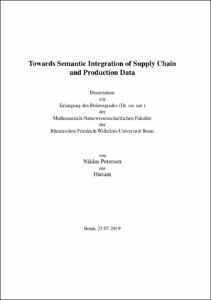Petersen, Niklas: Towards Semantic Integration of Supply Chain and Production Data. - Bonn, 2020. - Dissertation, Rheinische Friedrich-Wilhelms-Universität Bonn.
Online-Ausgabe in bonndoc: https://nbn-resolving.org/urn:nbn:de:hbz:5-59656
Online-Ausgabe in bonndoc: https://nbn-resolving.org/urn:nbn:de:hbz:5-59656
@phdthesis{handle:20.500.11811/8762,
urn: https://nbn-resolving.org/urn:nbn:de:hbz:5-59656,
author = {{Niklas Petersen}},
title = {Towards Semantic Integration of Supply Chain and Production Data},
school = {Rheinische Friedrich-Wilhelms-Universität Bonn},
year = 2020,
month = nov,
note = {Data is a critical ingredient for many analyses. Its recent exponential growth allowed utilizing computers to solve previously considered hard problems. For organizations and entire economies, being able to solve harder problems results in a competitive advantage. However, organizations often struggle to make use of the growing amount of data. Data is often spread in various places, organized in different structures and described in different models. While the rising popularity in initiatives such as Industry 4.0, Smart Manufacturing and Cyber-physical systems show that there is a strong interest in new data-driven applications in the industry, it is not completely clear yet how these ideas can be realized. Advances in the field of Knowledge Representation, in particular the Semantic Web, provide a promising technology stack to better organize and describe heterogeneous and distributed data.
In this thesis, we investigate how these semantic technologies can be applied in an industrial context. In particular, we look into methods to better describe and integrate data such that it can be used by more individuals and applications outside of the original use case of a particular dataset. With a focus on Supply Chains and production data, the goal is to support decision makers in optimizing supply chains or factory production lines. This includes providing them with a holistic view on the digital and physical assets of an organization and creating a common understanding on the nature of their domain, inside and outside the organization.
In order to tackle these challenges, we propose various ontologies to describe Supply Chains, factories, production lines and enterprises as a whole. We evaluate these ontologies with queries which represent KPIs defined by domain experts. In particular, we show how a supply chain ontology can enable the management of inter-organizational supply chains. We demonstrate how sensor and production data from heterogeneous databases can be integrated using semantic technologies. For the development of ontologies, we further propose an ontology authoring environment. The environment supports industrial domain experts and knowledge engineers to work collaboratively on the formalization of ontologies which represent a common understanding of a particular domain. Our results show that the semantic integration of industrial data comes at a reasonable performance and that it can help an organization to better exploit their existing data.},
url = {https://hdl.handle.net/20.500.11811/8762}
}
urn: https://nbn-resolving.org/urn:nbn:de:hbz:5-59656,
author = {{Niklas Petersen}},
title = {Towards Semantic Integration of Supply Chain and Production Data},
school = {Rheinische Friedrich-Wilhelms-Universität Bonn},
year = 2020,
month = nov,
note = {Data is a critical ingredient for many analyses. Its recent exponential growth allowed utilizing computers to solve previously considered hard problems. For organizations and entire economies, being able to solve harder problems results in a competitive advantage. However, organizations often struggle to make use of the growing amount of data. Data is often spread in various places, organized in different structures and described in different models. While the rising popularity in initiatives such as Industry 4.0, Smart Manufacturing and Cyber-physical systems show that there is a strong interest in new data-driven applications in the industry, it is not completely clear yet how these ideas can be realized. Advances in the field of Knowledge Representation, in particular the Semantic Web, provide a promising technology stack to better organize and describe heterogeneous and distributed data.
In this thesis, we investigate how these semantic technologies can be applied in an industrial context. In particular, we look into methods to better describe and integrate data such that it can be used by more individuals and applications outside of the original use case of a particular dataset. With a focus on Supply Chains and production data, the goal is to support decision makers in optimizing supply chains or factory production lines. This includes providing them with a holistic view on the digital and physical assets of an organization and creating a common understanding on the nature of their domain, inside and outside the organization.
In order to tackle these challenges, we propose various ontologies to describe Supply Chains, factories, production lines and enterprises as a whole. We evaluate these ontologies with queries which represent KPIs defined by domain experts. In particular, we show how a supply chain ontology can enable the management of inter-organizational supply chains. We demonstrate how sensor and production data from heterogeneous databases can be integrated using semantic technologies. For the development of ontologies, we further propose an ontology authoring environment. The environment supports industrial domain experts and knowledge engineers to work collaboratively on the formalization of ontologies which represent a common understanding of a particular domain. Our results show that the semantic integration of industrial data comes at a reasonable performance and that it can help an organization to better exploit their existing data.},
url = {https://hdl.handle.net/20.500.11811/8762}
}






